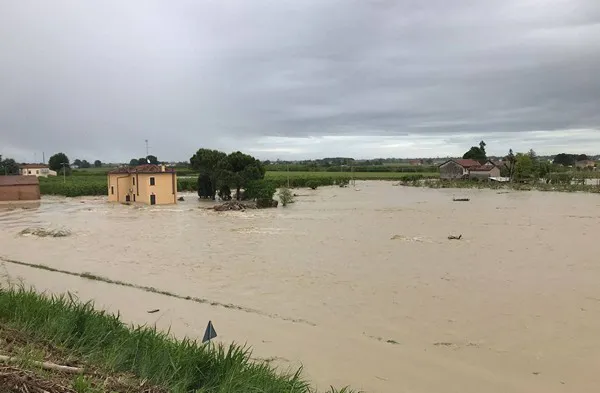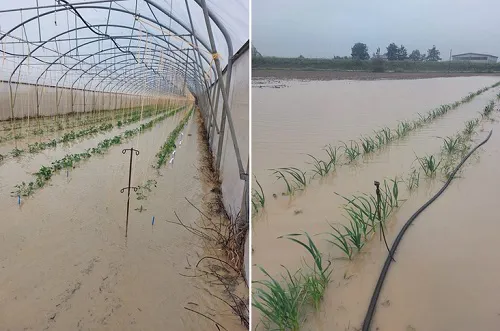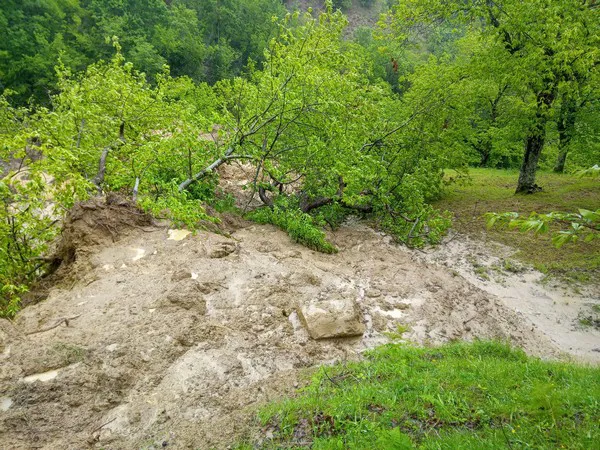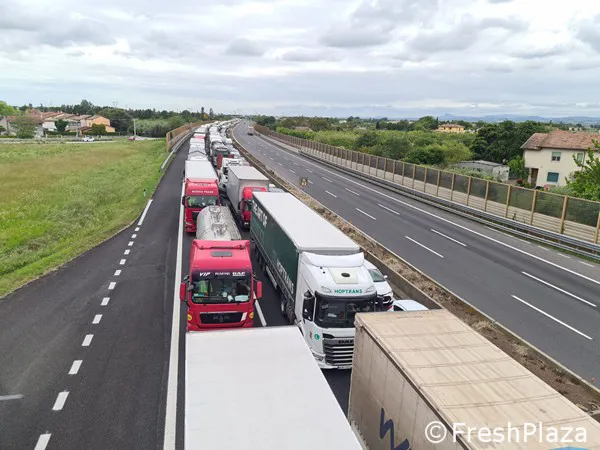"We've lost a colleague, an acquaintance, a friend. The loss of life is the worst result of the catastrophe that struck Cesena and the regions of Emilia-Romagna and De Marche [in Italy] on May 16," Matteo Evangelisti, Biondi Giulio's manager, told FreshPlaza on Wednesday. This cultivation company has a stall at the Cesena wholesale market, where Sauro Manuzzi was a mainstay. Everyone knew this aromatic herb seller. His wife, who went missing first, was also found lifeless in Cesenatico, 20 km from their farm.
The state of emergency is still in effect in Italy. The area around Lugo began flooding early yesterday morning, May 18. "In the hills of Romagna, entire villages are isolated because the roads have been washed away. People have no electricity or water. The civil defense department is trying to reach them," says Matteo.
 The Santerno River breached its bank, flooding Ca' di Lugo - San Lorenzo in the province of Ravenna. Photo: Leandra Ricci Bitti on Meteo Emilia Romagna
The Santerno River breached its bank, flooding Ca' di Lugo - San Lorenzo in the province of Ravenna. Photo: Leandra Ricci Bitti on Meteo Emilia Romagna
Vast areas of the provinces of Forlì-Cesena, Ravenna, and Bologna are submerged. "There's enormous damage to farms and rural infrastructure in Romagna and The Marches. Thousands of hectares of kiwis, plums, pears, and apples, plots of vegetables, fields of grain, nurseries, farm buildings, machinery, and other infrastructure flooded," says Ettore Prandini, president of the agriculture organization Coldiretti.

Damage in the hills too
"The cyclone not only damaged fields on the plains but hit the Apennines too. Chestnut cultivation has been hit hard. The water and landslides swept away century-old trees," lament Monia and Sergio Rontini of Il Regno Del Marrone. This company's organic chestnut grove is in the Castel del Rio municipality, at altitudes between 400 to 700 meters, on steep slopes. The same family has run this farm for more than four generations. "With no chestnut cultivation, this could be the final blow," Monia and Sergio explain.
 Damage to Il Regno Del Marrone's chestnut grove.
Damage to Il Regno Del Marrone's chestnut grove.
Choked roots
"This is the worst weather since just after the war. The 2023 harvest is seriously compromised, but there may also be problems for subsequent years," says Carlo Carli, president of the interprovincial agricultural organization, Confagricoltura. The vegetable plots between Cesena and San Mauro Pascoli have been wiped out.
High-value crops are grown there. There are also major problems in Cesena's strawberry greenhouses, an important crop for the area. And the silt the rainfall deposits on the soil increases the risk of root suffocation, even for trees.
Supplies compromised
"The bad weather and blocked roads affect transportation, too. The A14 freeway is closed in some places, as are the toll gates in Forlì and Cesena. That's causing issues in fruit and vegetable shipment and additional company losses. Our sector, which is at very high risk, needs a large-scale plan to support its economic fabric," Carlo continues.
 The A14 freeway was at a standstill on May 18 at noon.
The A14 freeway was at a standstill on May 18 at noon.
Ministers summit
At a summit meeting between ministers Carlo Nordio (Justice), Francesco Lollobrigida (Agriculture), Marina Calderone (Labor and Social Policies), and the state secretaries Bignami and Leo, they discussed suspending tax and social security obligations for companies.
"It's essential to suspend payment obligations for community expenses in the flooded areas, as has already been done for mortgages. Thought should also be given to increasing compensation rates for crop damage, based on the Agricat Fund provisions," states a Copagri representative.
Colderetti agrees: "Given the unusual situation, we believe a special government decree is needed to allocate sufficient funds to compensate for the damage, which is increasing hourly in the agricultural and horticultural sectors."
CSO Italy in constant contact with its members
"We're in constant contact with our members in the hardest hit areas in Bologna, Forlì, Cesena, Ravenna, and Rimini. These are also largely at our working area's heart," says Paolo Bruni, president of the Italian horticultural companies service organization, CSO Italy. "The picture that's emerging is undoubtedly dramatic. The Emilia-Romagna region's President, Stefano Bonaccini, correctly compares it to an earthquake's effects."
 Paolo Bruni, CSO Italy CEO
Paolo Bruni, CSO Italy CEO
"We've been talking about climate change for a long time, and, sadly, this is awful proof of that. Within a few days, the climate switched from extreme drought to flooding. In some areas, 300 mm of water fell, as much as in all of 2022," Paolo explains.
"I fear this unprecedented situation could, unfortunately, become the norm. I don't remember such an extreme phenomenon ever occurring on the Adriatic side of our peninsula. If anything similar happened, it was rather on the Tyrrhenian side, between Liguria and Tuscany, or in Sicily and Sardinia."
"Once this crisis passes, projects will have to be started on hydraulic works to reduce the water's force during river flooding. That should be done by temporarily diverting some of the flood wave. In Emilia-Romagna, such works have so far been only partially completed. The plans are there, but some still lie in government officials' desk drawers. First, we must rescue people, then rebuild homes and workplaces. But, after that, we must devise measures to prevent this from happening again," Paolo concludes.
